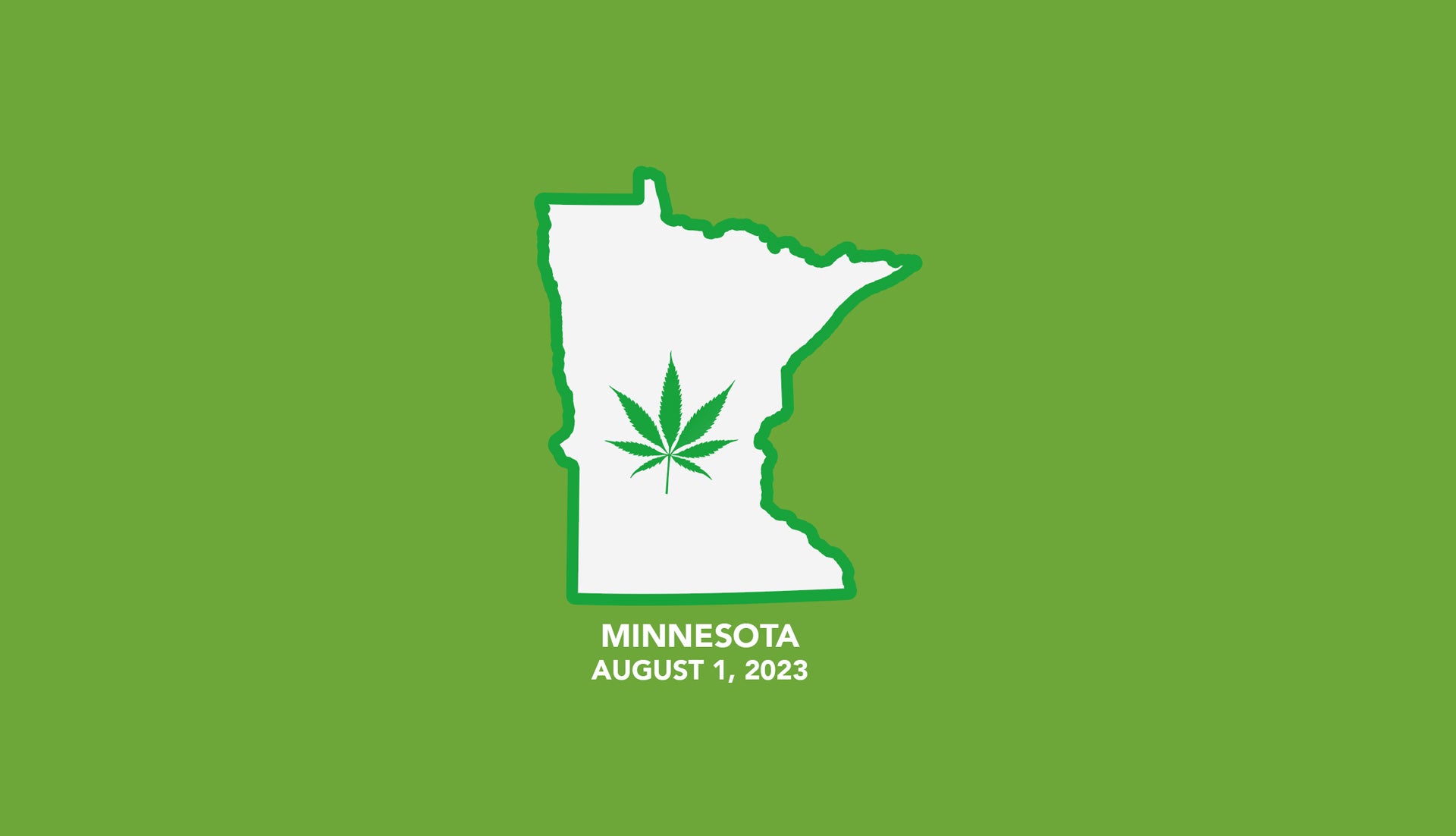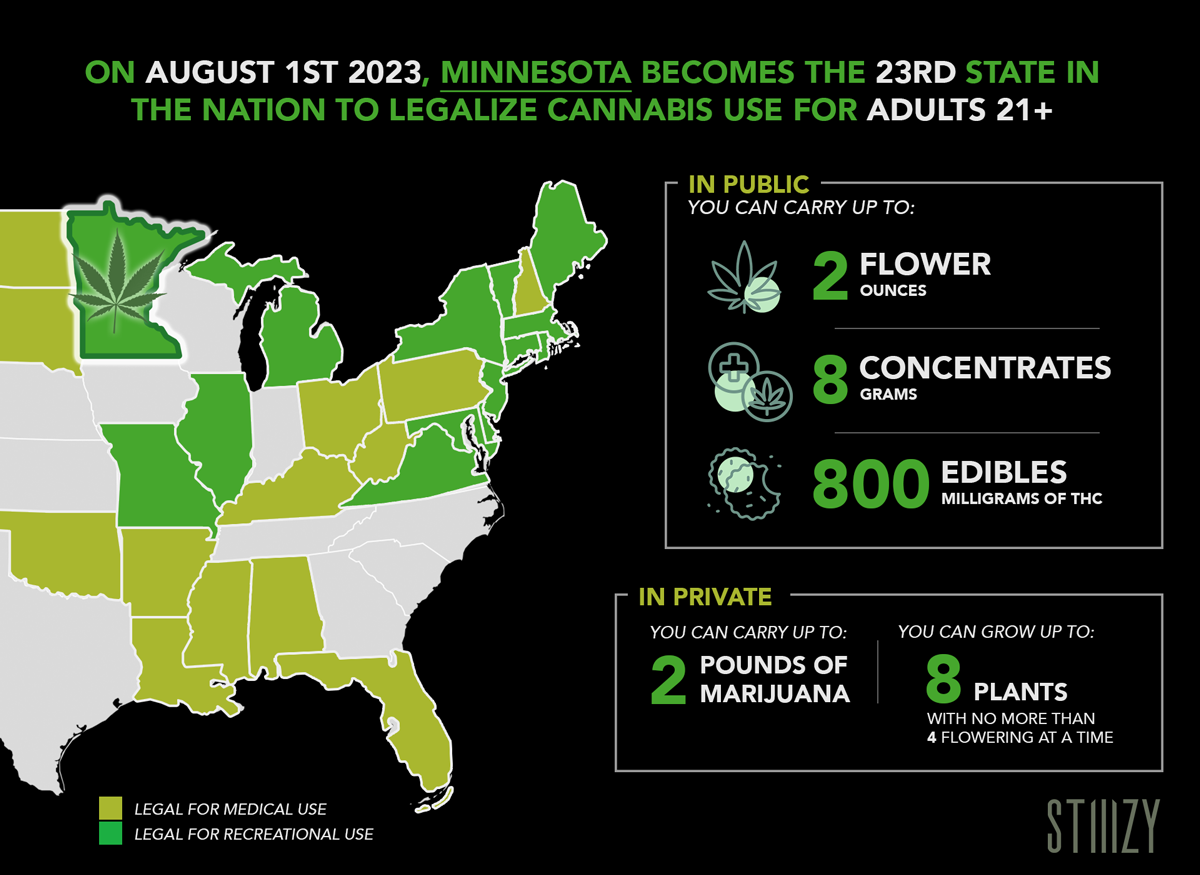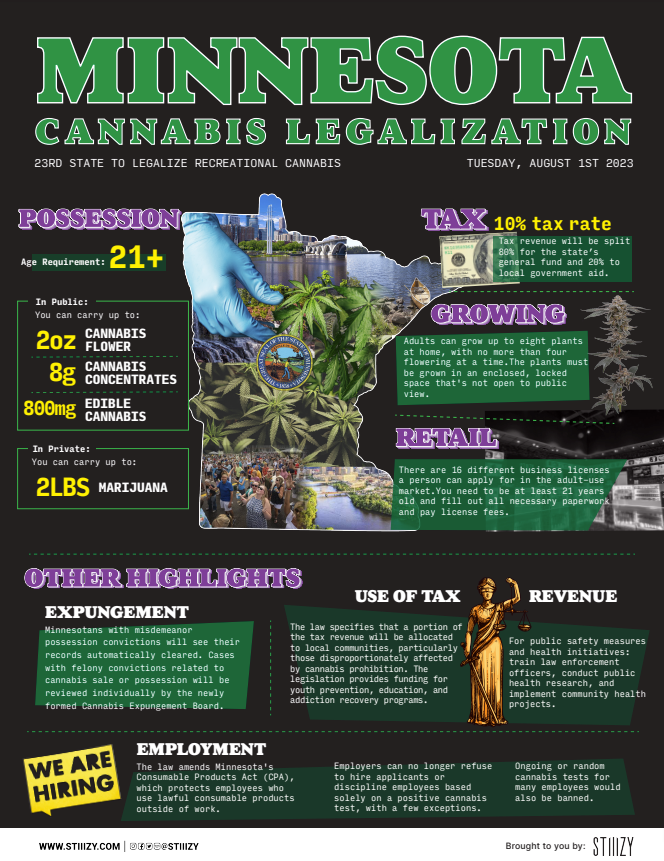Minnesota Weed Legalization 2023

Starting from tomorrow, August 1 2023, residents of Minnesota will be able to legally possess and grow their own marijuana for recreational purposes. This makes Minnesota the 23rd state in the U.S. to legalize recreational cannabis.
The journey to legalizing recreational marijuana to this point has been a winding road, filled with spirited debates, legislative hurdles, and a steadfast commitment to reform. The result is a comprehensive law that redefines the relationship between Minnesotans and cannabis.
The legalization of weed in the land of 10,000 lakes is a societal shift that impacts residents' lives in various ways, from the freedom to enjoy cannabis recreationally to the potential for new business opportunities in the burgeoning cannabis industry.
The New Law and Its Provisions
Minnesota's weed legalization law, a groundbreaking piece of legislation, has set the stage for a new era of cannabis freedom in the state. This law, a beacon of change, has laid down the ground rules for the possession, use, and cultivation of cannabis.
Click here or the image below to view infographic in .pdf.
Possession
-
Age Requirement: Adults 21 and older
-
In public, you can carry up to 2 ounces of cannabis flower, 8 grams of cannabis concentrates, or edible cannabis products containing up to 800 milligrams of THC.
-
In private (home), you can possess up to 2 pounds of marijuana.
Consumption
-
Cannabis can be legally consumed on private property, including private homes. Eventually, it will be allowed at special events where organizers have permits.
-
It is illegal to have an open container of cannabis in your car. It's illegal to be driving under the influence of cannabis just like it is to be driving under the influence of alcohol.
-
It's still illegal to smoke or vape cannabis anywhere that tobacco smoking is prohibited, including most businesses, apartment buildings, and college campuses. Nothing in the state law prohibits smoking it on a public sidewalk, but local ordinances might.
Growing
-
Adults can grow up to eight plants at home, with no more than four flowering at a time.
-
The plants must be grown in an enclosed, locked space that's not open to public view, whether that's indoors or in a garden.
Retail
-
There are 16 different business licenses a person can apply for in the adult-use market, and there are additional licenses for medical cannabis and "low-potency," as the law describes them, hemp-derived THC edibles.
-
To be eligible to operate a business, you need to be at least 21 years old and fill out all necessary paperwork and pay license fees. A cultivator license, for example, will cost $10,000 to apply, $20,000 for the initial license, and $30,000 to renew.
Public Safety Measures
To ensure a smooth and safe transition to legal weed, the law includes provisions for public safety. It allocates funds for law enforcement training to better identify impaired drivers and mandates a pilot project to study the creation of an oral fluid roadside test to detect cannabis impairment.
The Market and Regulation
At the helm of this burgeoning industry is the newly established Office of Cannabis Management. This state agency is tasked with the crucial role of licensing cannabis and hemp businesses, ensuring that the market operates within the bounds of the law.

The law requires manufacturers and retailers of lower-potency hemp THC edibles and beverages, which were legalized in Minnesota last year, to be licensed and regulated by the Office of Cannabis Management starting in 2025.
The law authorizes the production and retail sale of marijuana flower, concentrates, topicals and edible products, such as candy and beverages. It also permits the sale of immature cannabis plants and seeds, as well as hemp-derived THC products.
Licenses
The law has paved the way for a diverse range of cannabis businesses by creating 16 types of licenses. From cannabis cultivators to retailers, wholesalers, transporters, and even event organizers, the opportunities are as varied as the strains of cannabis themselves.
The Minnesota law gives priority to social equity considerations for awarding licenses. This can mean applicants from low-income areas that have felt disproportionate effects from marijuana being illegal, people whose convictions have been expunged, and military veterans who lost their honorable status due to a marijuana-related offense, among others.
Local governments have the ability to limit the number of cannabis retailers to one for every 12,500 residents. This provision allows local communities to control the density of cannabis retailers in their areas.
Retailers can start selling marijuana seeds if they comply with labeling and other requirements set by the Minnesota Department of Agriculture.
Tax Revenue from Cannabis Sales
The law also addresses the financial side of things, imposing a 10% tax rate on the sale of cannabis products. This tax revenue, a new stream of income for the state, is expected to fund various initiatives, including public safety measures and community development projects.
In setting the tax rate, lawmakers were mindful of the need to strike a balance. The goal was to generate revenue without driving up prices to the point where consumers turn back to the illicit market. As such, the 10% tax rate is designed to keep legal cannabis competitive.
The cannabis tax revenue will be split 80% for the state’s general fund and 20% to local government aid.
Expungement and Social Equity
In the wake of Minnesota's weed legalization, the state is not just looking forward, but also backward, addressing past injustices linked to cannabis prohibition. The law introduces a powerful tool for righting these wrongs: expungement.
Automatic Expungement
Under the new law, Minnesotans with misdemeanor possession convictions will see their records automatically cleared. This move acknowledges the disproportionate impact of cannabis prohibition on certain communities and offers a fresh start to thousands of individuals.
The law mandates the expungement of all misdemeanor marijuana offenses. For those with felony convictions related to cannabis sale or possession, the law offers a ray of hope. The newly formed Cannabis Expungement Board will review these cases individually, considering factors such as the circumstances of the offense and the individual's subsequent conduct.
Social Equity
Beyond expungement, the law also takes significant strides towards promoting social equity in the cannabis industry. It establishes a Division of Social Equity within the Office of Cannabis Management, tasked with providing outreach and services to communities disproportionately affected by cannabis prohibition.
In a bid to ensure a diverse and inclusive cannabis industry, the law gives higher priority to "social equity applicants" for cannabis business licenses. This provision aims to ensure that those most impacted by cannabis prohibition can reap the benefits of the new legal market.
The Impact on Employment
The law ushers in significant changes to workplace policies, reshaping the dynamics between employers and employees in the context of cannabis use.
The law amends Minnesota's Consumable Products Act (CPA), which protects employees who use lawful consumable products outside of work. With the legalization of weed, cannabis now falls under the umbrella of "lawful consumable products," offering new protections for employees who partake.
It respects the rights of employees to enjoy legal cannabis outside of work, while also acknowledging the responsibility of employers to maintain a safe and productive workplace.
The Drug and Alcohol Testing in the Workplace Act
The law also brings about substantial changes to the Minnesota Drug and Alcohol Testing in the Workplace Act (DATWA).
-
Employers can no longer refuse to hire applicants or discipline employees based solely on a positive cannabis test, with a few exceptions.
-
Ongoing or random cannabis tests for many employees would also be banned.
Despite these changes, the law recognizes the need to maintain safety standards in certain jobs. For positions involving the care of children or medical patients, or jobs requiring a commercial driver's license, employers can still conduct regular drug testing.
Cannabis Research
As Minnesota steps into the brave new world of legal weed, the role of research becomes paramount. The state's weed legalization law recognizes this, allocating funds and resources to delve into the many unknowns surrounding cannabis.
The law designates the University of Minnesota as a hub for cannabis research. The university is set to establish a center dedicated to studying the plant, its various strains, and its effects on public health. This move underscores the state's commitment to evidence-based policy-making.
One of the key areas of focus for cannabis research is understanding its impact on public health. The law mandates the collection and analysis of data on cannabis use patterns, the effectiveness of public health interventions, and the impact of legalization on youth usage.
The Youth Factor: A Priority Concern
The potential impact of weed legalization on youth cannabis use is a topic of particular concern. Early research suggests that legalization may not significantly affect youth usage rates, but ongoing studies will provide more definitive answers.
Research is the compass guiding Minnesota's journey through the uncharted territory of legal weed. By investing in research, the state aims to ensure that its approach to cannabis regulation is informed, nuanced, and responsive to emerging evidence. This commitment to research underscores Minnesota's dedication to a thoughtful and responsible approach to weed legalization.
The Impact on Tribal Medical Marijuana Dispensaries
Minnesota, home to eleven (11) sovereign tribal nations, has always respected the unique status of these communities. The state's weed legalization law continues this tradition, acknowledging the autonomy of tribal nations in the realm of cannabis regulation.
The law affirms the right of tribal nations to establish their own medical marijuana programs. This provision respects the sovereignty of tribal nations, allowing them to make decisions that best serve their communities.
The Red Lake Nation for example, plans to sell recreational marijuana at its existing medical cannabis dispensary starting Aug. 1. Marking the 1st recreational marijuana dispensary in Minnesota.
These dispensaries can continue to operate under the regulations set by their respective tribal nations, independent of the state's cannabis laws.
Minnesota's approach to weed legalization is a testament to the state's respect for tribal sovereignty. By acknowledging the right of tribal nations to regulate cannabis within their territories, the law underscores the importance of tribal autonomy in the evolving landscape of cannabis regulation.
The Use of Tax Revenue from Marijuana Sales
Minnesota's weed legalization law doesn't just change the rules around cannabis use and cultivation—it also opens up a new stream of revenue for the state. The sale of cannabis products is subject to a levy that promises to fill the state's coffers with a green windfall.

Investing in the Community
The revenue generated from cannabis sales isn't just going into a general fund. The law specifies that a portion of the tax revenue will be allocated to local communities, particularly those disproportionately affected by cannabis prohibition. This move ensures that the benefits of legalization are shared broadly across the state.
The legislation provides funding for youth prevention, education, and addiction recovery programs. This includes funding for media campaigns, data collection, and grants for local and Tribal public health departments to support education, technical assistance, and outreach.
For Public Safety and Health
The law also earmarks a portion of the cannabis tax revenue for public safety measures and health initiatives. These funds will be used to train law enforcement officers, conduct public health research, and implement community health projects.
In essence, the taxation of cannabis sales creates a win-win situation. The state generates revenue, which can be reinvested in the community, while also ensuring that the cannabis market operates within a regulated framework. This approach exemplifies the potential benefits of weed legalization in Minnesota.
Cannabis and Public Health
With the legalization of weed in Minnesota, cannabis has become a prominent feature in the state's public health landscape. The law acknowledges this reality, incorporating provisions to guide safe and responsible cannabis use.
Cannabis and Pregnancy
The law includes guidelines for specific populations, such as pregnant and breastfeeding individuals. It advises against cannabis use during pregnancy and breastfeeding, reflecting the current scientific consensus on potential risks.
Discussing Cannabis with Healthcare Providers
The law also encourages individuals to discuss their cannabis use with healthcare providers. This open dialogue can help ensure that cannabis use does not interfere with other medications or exacerbate existing health conditions.
Safe Storage
Another key public health provision in the law pertains to the safe storage of cannabis products. The law advises keeping cannabis out of the reach of children, underscoring the importance of preventing accidental ingestion.
Minnesota's weed legalization law adopts a public health approach to cannabis regulation. By providing guidelines for safe use and encouraging open conversations with healthcare providers, the law aims to ensure that the transition to legal cannabis is as safe and smooth as possible.
Prospect of Cannabis in Minnesota

As Minnesota embarks on this new chapter of legal weed, it's clear that the journey is just beginning. The state's weed legalization law has laid the groundwork, but the future of cannabis in Minnesota will be shaped by ongoing research, regulatory adjustments, and the experiences of Minnesotans themselves.
The cannabis market in Minnesota is expected to evolve rapidly in the coming years. As businesses establish themselves and consumers become more familiar with legal cannabis, we can anticipate changes in product offerings, pricing, and consumer preferences.
Research will play a crucial role in shaping the future of cannabis in Minnesota. Ongoing studies will provide insights into public health outcomes, the impact of cannabis on youth, and the effectiveness of regulatory measures. This research will inform future policy decisions, ensuring that Minnesota's approach to cannabis remains responsive and evidence-based.
The commitment to social equity in the cannabis industry is not a one-time initiative, but an ongoing effort. The state will continue to prioritize social equity applicants for cannabis business licenses and allocate cannabis tax revenue to communities disproportionately affected by cannabis prohibition.
Minnesota's approach to weed legalization is not just about the here and now, but also about the future. The state is committed to a sustainable, responsible, and equitable approach to cannabis, guided by research and grounded in a commitment to the well-being of all Minnesotans. As we look to the future, it's clear that the story of legal weed in Minnesota is just beginning.
STIIIZY complies with all applicable state laws regarding the sale and marketing of cannabis products. This content is intended for adults 21+ in jurisdictions where cannabis use is legal under state law. By engaging with this material, you acknowledge that you are of legal age in your jurisdiction.
This content is for informational and educational purposes only. It is not intended to diagnose, treat, cure, or prevent any disease or medical condition. STIIIZY makes no health claims about cannabis products. Consult a licensed healthcare professional before using cannabis, especially if you are pregnant, nursing, or have a medical condition.
Cannabis products may affect individuals differently. Consume responsibly and avoid operating vehicles or machinery after use. STIIIZY disclaims all liability for any adverse effects, legal consequences, or misuse resulting from the use of our products or reliance on this content.
Cannabis laws vary by state and locality. This content does not constitute legal advice. Users are responsible for understanding and complying with their local regulations.
Statements about product effects or benefits are based on general industry knowledge and user experiences. Individual results may vary. STIIIZY does not guarantee specific outcomes.
References to third-party studies, testimonials, or external resources are provided for context only. STIIIZY does not endorse or validate these materials unless explicitly stated.
The views and opinions expressed in this blog are those of the author and do not necessarily reflect the official policy or position of STIIIZY.


